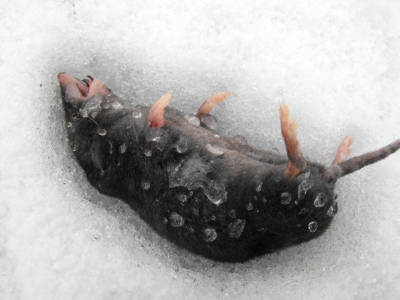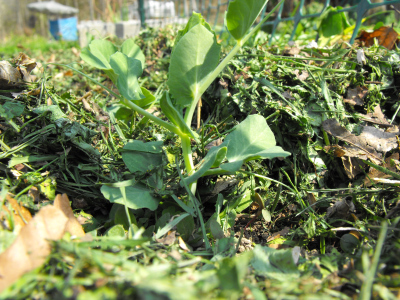
Disadvantages of mulch
At the moment, it looks
like my
eventual solution to the weeding problem will be to try to keep my beds
under a near permanent mulch rather than spacing
the plants far enough
apart that they can be hoed. But Solomon is very
anti-mulch ---
disturbing since he's been spot on about so many other things.
Maybe mulching isn't such a good idea after all?
 Solomon lists half a dozen
disadvantages of permanent mulching.
His biggest gripe is the "plague levels of small animals" that move
into the mulch if you don't live in a cold enough climate. I
assume he's talking about moles and voles and shrews here, and I feel
extraordinarily lucky that Lucy is a small animal killer and doesn't
let any of these survive in our garden.
Solomon lists half a dozen
disadvantages of permanent mulching.
His biggest gripe is the "plague levels of small animals" that move
into the mulch if you don't live in a cold enough climate. I
assume he's talking about moles and voles and shrews here, and I feel
extraordinarily lucky that Lucy is a small animal killer and doesn't
let any of these survive in our garden.
Solomon's other
arguments against mulch don't carry as much weight with
me. He notes that if you use hay, you end up with a lot of weeds
--- so don't use hay. If your summers aren't hot enough or if
your mulch is too woody, it won't rot into the bed before summer and
will tangle with your hoe --- but you shouldn't need to hoe much if
your bed is well mulched. Mulched garden soil is slower to warm
up in the spring than bare earth --- so rake the mulch off a few weeks
before you need to plant your earliest crops. He thinks that
adding too much compost
or mulch to your soil will result in soil
nutrients out of balance,
which will make your food less nutritious --- so use dynamic
accumulators to reachieve that balance.

Proponents of mulch
argue that the practice conserves water, but
Solomon makes the legitimate point that most water lost from the soil
comes out of plant leaves, not from bare soil. He points out that
mulching only
keeps the soil surface moist and doesn't reduce overall moisture
loss. On the other hand, I would argue that mulching does prevent
soil crusts from forming (something that Solomon considers a big
problem in his garden) and allows more water to soak in rather than
running off in clay soil. I suspect that overall, mulch results
in a net gain of moisture for the plants in our garden.
So far, our experiments
with mulch over the last year have been highly successful, but I'll
keep all of Solomon's arguments in mind and will be willing to give up
on mulching if I start to see major disadvantages.
This post is part of our Gardening When It Counts lunchtime series.
Read all of the entries:
|
Want more in-depth information? Browse through our books.
Or explore more posts by date or by subject.
About us: Anna Hess and Mark Hamilton spent over a decade living self-sufficiently in the mountains of Virginia before moving north to start over from scratch in the foothills of Ohio. They've experimented with permaculture, no-till gardening, trailersteading, home-based microbusinesses and much more, writing about their adventures in both blogs and books.
Want to be notified when new comments are posted on this page? Click on the RSS button after you add a comment to subscribe to the comment feed, or simply check the box beside "email replies to me" while writing your comment.

Coupon Codes --- I tend to agree.
dp --- The time savings gets me every time too. It seems like every hour I spend mulching saves me at least two or three hours over the growing season in weeding time. Of course, the soil health is also key --- I agree that mulch makes good soil critters very happy!
I'm jealous of your wet hay! I always read about people who find that, and I never do!